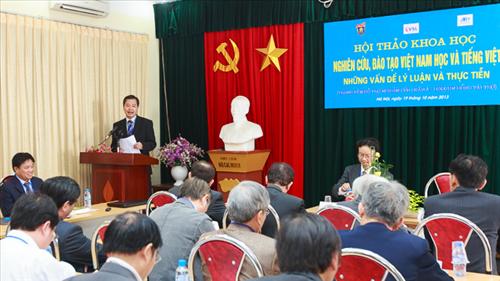

Assoc. Prof. Dr. Pham Quang Minh (Vice Rector) delivered the opening remarks at the workshop.
The conference received 45 papers, divided into four main sections corresponding to four subcommittees: Vietnamese Studies and Vietnamese Studies Training; Vietnamese Culture, History, and Society; Vietnamese Literature and Arts; and Vietnamese Linguistics and Methods of Teaching Vietnamese to International Students.
At the conference, one of the issues that received the most attention and discussion from the delegates was the current state of research and training in Vietnamese studies in Vietnam and the direction for training in Vietnamese studies at the Faculty of Vietnamese Studies and Vietnamese Language (Faculty of Social Sciences and Humanities, Vietnam National University, Hanoi).

The workshop was attended by many leading experts in Vietnamese studies and the Vietnamese language.
Vietnamese Studies was first introduced into university curricula in Vietnam in 1994. In recent years, Vietnamese Studies has consistently been included in the training programs of many universities. In the 2013-2014 academic year, 85 colleges and universities nationwide offered over 6,000 places in Vietnamese Studies. In reality, the training objectives of most universities focus on specialized fields such as: tour guiding, culture and tourism, tourism studies, or ethnic culture. This situation reveals a misunderstanding of the concept of Vietnamese Studies as an interdisciplinary science that deciphers the issues of Vietnam. Most training institutions only pursue a narrow specialization within Vietnamese Studies. Furthermore, many institutions offering Vietnamese studies programs lack sufficient human resources and other necessary conditions to train students in this field. They also lack clear training objectives, and their focus on research to support teaching or international exchange is very limited. This leads to a current Vietnamese studies training landscape that is quite spontaneous, fragmented, and lacks quality control.
The Faculty of Vietnamese Studies and Vietnamese Language has a long-standing tradition and reputation in training in Vietnamese language and culture for the past 45 years. Since the 2010-2011 academic year, the Faculty has begun offering Vietnamese Studies programs in two specializations: Specialization A for Vietnamese students (currently training 4 cohorts with 250 students) and Specialization B for international students (currently training 3 cohorts with nearly 80 students). Although a relatively late entrant into the research and development of Vietnamese Studies as an interdisciplinary faculty, the Faculty benefits from many advantages and is highly determined to establish its position in this field.

Associate Professor Dr. Nguyen Thien Nam (Head of Department) answers questions from the audience regarding the content of the first report presented at the plenary session.
Regarding the Faculty's training orientation, many opinions suggest that the Faculty should leverage its strengths in Vietnamese language training and the University's tradition of training in social sciences and humanities in developing and training Vietnamese studies graduates. The training of Vietnamese studies graduates should aim to serve the diverse needs of life, society, and the country. Therefore, the training program should not only provide basic knowledge of Vietnamese studies but also in-depth knowledge to enable graduates to participate in specific fields such as tourism, journalism, office work, consulting, and language teaching. There should be a clear distinction between training in Vietnamese studies for foreigners and Vietnamese students. In particular, given its broad international relations, the Faculty should focus on promoting Vietnamese studies training for foreigners and expanding international cooperation with Vietnamese studies centers in other countries. In addition, the Faculty needs to continue to affirm and further develop its strengths in teaching Vietnamese language and culture to foreigners, focusing on training highly qualified individuals to teach these subjects.
The delegates also affirmed that, with its current potential and position, the Faculty of Vietnamese Studies and Vietnamese Language has the capacity to establish itself as a leading training unit in Vietnamese studies in Vietnam and to strive for international recognition, contributing to the development of Vietnamese studies worldwide, as expected by Deputy Prime Minister Nguyen Thien Nhan during his visit to the University of Social Sciences and Humanities in 2008.
At the conference, academic exchanges not only helped to clarify the understanding of the concept of Vietnamese Studies, position Vietnamese Studies within the map of social sciences and humanities, and point out the limitations in current Vietnamese Studies training; but also contributed to establishing cooperative relationships and initially forming a network of research and training institutions for Vietnamese Studies at Vietnamese universities. The conference was one of a series of activities of the Faculty of Vietnamese Studies and Vietnamese Language towards the 45th anniversary of the Faculty's establishment (1968-2013) and 57 years of teaching Vietnamese to foreigners (1956-2013).
Author:Thanh Ha
Newer news
Older news